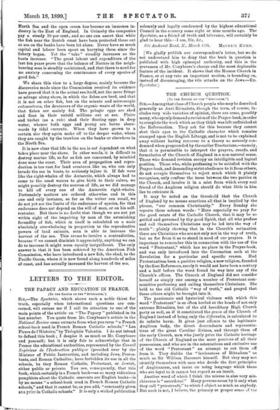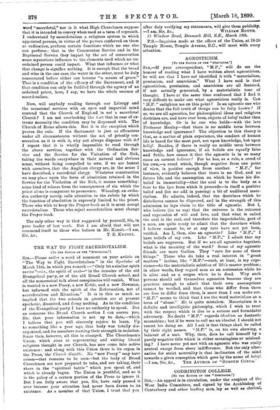THE CHURCH QUESTION. [To THE EDITOR Or THE "SPECTATOR.'] SIR, —Among
that class of Church people who may be described generally as Anti-Ritualists, though the term, of course, in- cludes very wide varieties of opinion, there are some, possibly many, -who openly demand a revision of the Prayer-book, in order to complete the work which as they think was left unfinished at the Reformation. They ask for this because they cannot shut their eyes to the Catholic character which remains stamped upon the English Liturgy, and is not to be explained away without having recourse to a theory so severely con- demned when propounded by the earlier Tractarians,—namely, that it is permissible to interpret the prayers, creeds, and formularies of the Church of England in a non-natural sense. Those who demand revision occupy an intelligible and logical position. Those who, while professing to be satisfied with the Prayer-book, and demanding strict obedience to it from others, do not scruple themselves to reject much which it plainly recognises, only confuse the issue between the two parties in the Church, and involve it in a mist from which every real friend of the Anglican religion should do what little in him lies to extricate it.
It may be noted on the threshold that the Church of England by no means sanctions all that is implied by the phrase, "our common Christianity." Every Sunday she repeats these solemn words : "More especially we pray for the good estate of the Catholic Church, that it may be so guided and governed by thy good Spirit, that all who profess and call themselves Christians may be led into the way of truth " : plainly showing that in the Church's estimation there are Christians who are not only not in the way of truth, bat so far from it as to stand in need of our prayers. It is important to remember this in connection with the use of the word "Protestant," which has no place in the Prayer-book, and was only introduced into the Coronation oath at the Revolution for a particular and specific reason. Had Protestantism been a positive religion, a new religion, founded by the first Reformers, surely it would not have been a century and a half before the word found its way into any of the Church's offices. The Church of England did not consider herself as simply one among a number of Protestant com- munities professing and calling themselves Christians. She held to the old Catholic "way of truth," and prayed that these others might be brought into it.
The passionate and hysterical violence with which this word "Protestant" is so often hurled at the heads of not only extreme Ritualists, but of the old hereditary High Church party as well, as if it constituted the genus of the Church of England instead of being only the differentia, is calculated to do infinite harm. It gives just offence to the legitimate Anglican body, the direct descendants and representa- tives of the great Caroline divines, and through them of the early Church, men who justly prize the Catholic heritage of the Church of England as the most precious of all their possessions, and who see in the ostentatious and exclusive use of the word " Protestant" an attempt to cut them off from it. They dislike the "lawlessness of Ritualism" as much as Sir William Harcourt himself. But they may not identify themselves with men who deride the first principles of Anglicanism, and insist on using language which those who are loyal to it cannot but regard as an insult.
Another word of which I think the misuse is also very mis- chievous is " sacerdotal." Many persons mean by it only what they call " priestcraft," to which I object as much as anybody. But such is not, I believe, the primary or proper sense of t he
word "sacerdotal," nor is it what High Churchmen suppose that it is intended to convey when used as a term of reproach. I understand by sacerdotalism a religions system in which appointed persons, in virtue of the powers conferred on them at ordination, perform certain functions which no one else can perform ; that in the Communion Service and in the Baptismal Service they impart by the act of consecration some mysterious influence to the elements used which no un- ordained person could impart. What that influence or what that change is signifies nothing. It is enough that the bread and wine in the one case, the water in the other, must be duly consecrated before either can become "a means of grace." That is a condition of the efficacy of the Sacrament, and if that condition can only be fulfilled through the agency of an ordained priest, here, I say, we have the whole essence of sacerdotalism.
Now, will anybody reading through our Liturgy and the occasional services with an open and impartial mind contend that the Church of England is not a sacerdotal Church ? I am not overlooking the f ict that in case of ex- treme necessity the condition may be dispensed with. The Church of Rome allows this. But it is the exception which proves the rule. If the Sacrament is just as efficacious under all circumstances without the act of priestly con- secration as it is with it, why not always dispense with it? I repeat that it is wholly impossible to read through the above services, together with the Ordination Ser- vice and the Service for the Visitation of the Sick, taking the words everywhere in their natural and obvious sense, without being compelled to own, if we are honest with ourselves, that the Anglican clergy are, in the sense I have described, a sacerdotal clergy. Whatever construction we may place upon the form of absolution retained in the Service for the Visitation of the Sick, it means something : some kind of release from the consequences of sin which the priest alone is competent to pronounce. Wheatley, an ortho- dox authority surely, calls attention to the rubric by which the function of absolution is expressly limited to the priest. Those who wish to keep the Prayer-book as it is must accept sacerdotalism. Those who reject sacerdotalism must change the Prayer-book.
The only other way is that suggested by yourself, Sir, in your leader of last week. Bat I am afraid that will not commend itself to those who believe in Mr. Kensit.—I am,







































 Previous page
Previous page